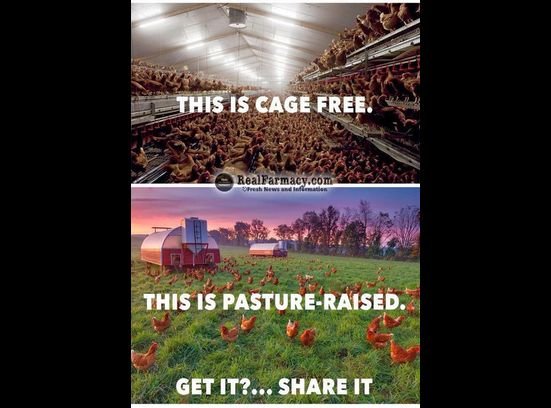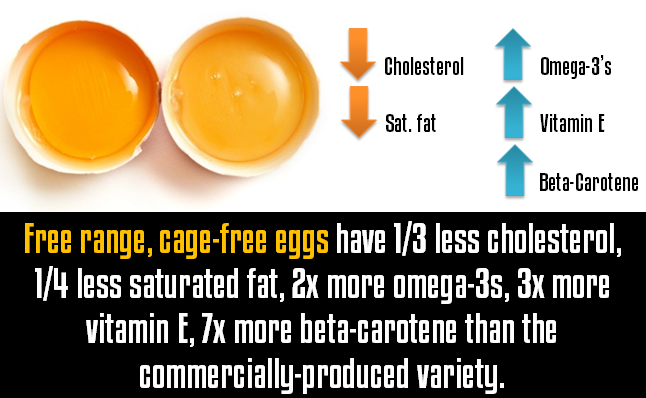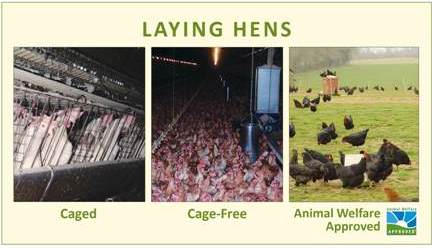What Are the Health Benefits of Free-Range Hens' Eggs?

The old adage "you are what you eat" certainly holds true when considering the nutritional value of eggs. Since the 1970s, studies have indicated that eggs from hens with access to pasture are better for you than eggs from birds kept in cages . Free-range hens that eat a healthy, natural diet pass on that benefit to you in the form of more nutritious eggs.

The Basics
Free-range chickens must have access to the outdoors, according to U.S. Department of Agriculture regulations, whereas growers raise conventional poultry confined indoors in cages. Pasture-raised hens eat a diet of grass and bugs in addition to their grain diet. Conventionally raised birds, on the other hand, are fed a strictly grain diet. Consumers should note, however, that regulations do not require that free-range hens have access to pasture, and studies comparing the hens' diet to the nutritional value of their eggs compare pasture-fed free-range hens to conventional birds. For the health benefits of free-range eggs, make sure you purchase them from pasture-fed flocks.
Less Fat and Cholesterol
The American Heart Association recommends reducing intake of both saturated fat and cholesterol in order to reduce your risk of heart disease and stroke. Testing by "Mother Earth News" found that eggs from pasture-fed free-range hens, on average, contained one-third of the cholesterol and one-fourth of the saturated fat as conventional eggs. A Sustainable Agriculture Research and Education study yielded similar results, with pastured hens producing eggs with 10 percent less fat and 34 percent less cholesterol.

More Vitamin A
Vitamin A promotes the healthy development of teeth, bones, soft tissue and tissues in the eyes needed for good vision; it also acts as an antioxidant and protects cells from damage. The "Mother Earth News" and SARE studies found that free-range eggs contained 67 percent and 40 percent more vitamin A, respectively, than conventional eggs.
More Vitamin E
Vitamin E also protects cells by acting as an antioxidant, in addition to promoting healthy blood and circulatory system function (see References 6). Free-range eggs contain more vitamin E than their conventional counterparts. The "Mother Earth News" survey found triple the vitamin E in the eggs they tested, and Pennsylvania State University research found double the vitamin E in the eggs of grass-fed hens (see References 2, pages 1 and 7).
Omega-3 Fatty Acids
Omega-3 fatty acids are a form of polyunsaturated fat known as "essential" fatty acids because the body cannot manufacture them on its own; you must consume them from food. Omega-3s are connected to heart health, lowering cholesterol and blood pressure, and other potential health benefits such as decreased risk of diabetes, stroke, digestive disorders, rheumatoid arthritis, some cancers and dementia . All three studies found higher amounts of omega-3s in free-range eggs versus conventional eggs. "Mother Earth News" reported the most modest differences, with the free-range eggs they tested containing only twice the omega-3s as conventional eggs, while the Penn State study found 2 1/2 times more. Free-range hens in the SARE study, however, produced eggs with four times the omega-3s as their caged sisters.

Price
Price comparison between conventional and free-range eggs is difficult since the USDA does not collect data on free-range egg prices or sales. The closest egg category the USDA tracks to free-range is organic eggs. Like free-range eggs, National Organic Program regulations require that organically raised hens have outdoor access; however, additional regulations concerning the animals' feed and other aspects of care can drive prices for organic eggs above those for free-range eggs . According to 2006 data collected by the USDA, conventional eggs cost, on average, $1.36 per dozen. Organic eggs, on the other hand, cost an average of $3.99 per dozen that year. Between March 2006 and March 2011, egg prices in general increased 33 percent, according to Consumer Price Index data .
Animal Welfare
Egg-laying hens confined to cages do not have space to move, stretch or engage in natural behaviors, which causes them to engage in repetitive or destructive behaviors, such as feather-pulling or pecking at their neighbors. Caged hens show more fearful behavior and become prone to skeletal problems because of captivity. Because free-range hens are allowed outdoor access, more space to move around and more opportunities to engage in natural behaviors, free-range eggs are generally regarded as a more humane alternative to conventionally produced eggs. However, regulations on the use of the term "free-range" do not specify the amount of time outdoors or space the hen must have, nor do they indicate that the hen must have access to a pasture diet .

Environmental Concerns
Large numbers of animals confined in small spaces, as seen in conventional egg-production facilities, pollute the air, water and soil with the vast amounts of manure they produce. Livestock manure runs off into waterways, causing nutrient pollution and algae blooms; gases from the manure pollute the air; and the medications and pathogens in the animals' waste causes health risks. Animal-based agriculture doesn't have to create a liability for the environment. In his 2006 book, "The Omnivore's Dilemma," Michael Pollan described poultry farms where rotating pastured poultry among fields provided enough manure to boost the nutrient levels in the soil without becoming toxic. At the same time, the chickens helped to control pests.
Nutrition
In addition to being healthier for the planet, free-range eggs are often healthier for you too. In 2007, Mother Earth News collected nutritional data from the eggs produced by 14 flocks of free-range pastured hens and compared that with data provided by the USDA for conventional eggs. The study revealed that the free-range eggs, on average, contained one-third less cholesterol and one-quarter less saturated fat, in addition to higher levels of vitamin A, beta-carotene, vitamin E and omega-3 fatty acids. One important distinction is that all hens in the Mother Earth News study were pasture-fed, which is not required by the USDA for free-range eggs , so it's possible the improved nutrition was a result of the diet, and not the housing conditions.

http://homeguides.sfgate.com/cage-vs-range-eggs-79620.html
http://homeguides.sfgate.com/health-benefits-freerange-hens-eggs-79219.html
Hi! I am a robot. I just upvoted you! I found similar content that readers might be interested in:
http://homeguides.sfgate.com/cage-vs-range-eggs-79620.html
Downvoting a post can decrease pending rewards and make it less visible. Common reasons:
Submit